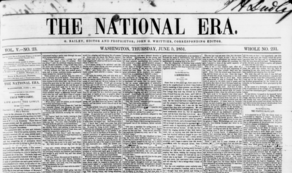
The National Era was an abolitionist newspaper published weekly in Washington, D.C., from 1847 to 1860. Gamaliel Bailey was its editor in its first year. The National Era Prospectus stated in 1847:
While due attention will be paid to Current Events, Congressional Proceedings, General Politics and Literature, the great aim of the paper will be a complete discussion of the Question of Slavery, and an exhibition of the Duties of the Citizen in relation to it; especially will it explain and advocate the leading Principles and Measures of the Liberty Party, seeking to do this, not in the spirit of the Party, but in the love of Truth—not for the triumph of Party, but for the establishment of Truth.
Each number contained four pages of seven (later eight) columns each. The National Era was noted for its large size and unique type. It featured the works of John Greenleaf Whittier, who served as associate editor, and the first publication, as a serial, of Harriet Beecher Stowe's Uncle Tom's Cabin (1851). It was also the setting for the first publication of Nathaniel Hawthorne's "The Great Stone Face". In 1859, after Mr. Bailey's decease, his wife, Margaret Lucy Shands Bailey, served as publisher until the time of its suspension, February 1860.
"The Soft Answer"
Two months after the establishment of The National Era, "The Soft Answer" was published on its back page by Timothy Shay Arthur. The short story was based on a business disagreement between two former friends, Mr. Singleton and Mr. Williams, set to be mediated by a Lawyer named Mr. Trueman. After receiving an unacceptable settlement offer from Williams, Singleton prepares an angry reply, only to be dissuaded from sending it by his lawyer. Singleton instead assents to signing a far more tactful and conciliatory reply composed by Trueman.
That tactful and conciliatory reply, which reconciled two former friends, is what is now known as "The Soft Answer". That idea suggested a gradualist approach to abolish slavery.
"Changes in the forms of the social organization have always been gradual.... Social reforms are the product of the characters and opinions of the individuals composing a society. Individual influences determine them at first, and they react upon the individual...".
This idea of gradual steps to get two sides to agree is something that many felt that the North and South could use to abolish slavery and integrate the African Americans into society.
See also
References
- "About The national era. (Washington [D.C.]) 1847-1860". National Era. Library of Congress. Retrieved 11 December 2012.
- ^ Coggeshall, William Turner (1860). "Margaret L. Bailey". The Poets and Poetry of the West: With Biographical and Critical Notices (Public domain ed.). Follett, Foster. ISBN 978-0-608-43014-0. Retrieved 22 August 2021.
- ^ "The National Era". African American Newspapers. Accessible Archives, Inc. Archived from the original on 10 September 2020. Retrieved 11 December 2012.
- Mellow, James R. Nathaniel Hawthorne in His Times. Boston: Houghton Mifflin Company, 1980: 292. ISBN 0-395-27602-0
- ^ Krywicki, Jarad (2013). ""The Soft Answer": The "National Era's" Network of Understanding". American Periodicals. 23 (2): 125–141. doi:10.1353/amp.2013.0017. JSTOR 24589014. S2CID 146663739.
External links
- National Era archive (1847–60) via Fultonhistory.com
